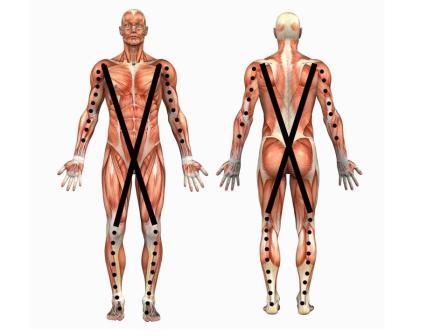368-Concept can help develop training and conditioning strategies that are effective and enrichening for the movement of running. In this first part we take a look at the "chains" within the runner's body. These kinetic chains describe how the different parts of the body work together in real life and sports and also how they are connected via muscles and fascia.
8 chains according to 368 conceptLet's examine the diagonal chains (marked black) as part of the running movement. First observe the excellent running mechanics demonstrated by Carl Lewis. We can draw a line from his left knee across his abdominal wall to his right arm. That diagonal front chain is now stretched out, loading elastic energy and ready to explode. The other side (right knee to left shoulder) is shorthened in order to create the opposite action. The same occurs with the diagonal back chains.
The diagonal chain system, a.k.a. the Double-X, is essentially important for the power and force production in running. Instead of only strengthening individual muscles it is crucial to integrate the whole kinetic team and work to improve the "stretch-shortening cycle" of the whole chain of muscles and fascial components. These diagonal chains have a huge role in creating the powerful rotational action in running.
In 368 -Training Systems diagonal chains are being challenged particularly by utilizing horizonal resistance exercises. The horizontal resistance applied from different directions/angles with different speeds allows the diagonal chains to be activated and strengthened in a way that is beneficial for a runner. Here are some of our basic exercise variations (1-arm press, 1-arm row, 2-arm rotation) performed in a split stance. These exercise variations emphasize the team work of all the body parts connected into one kinetic chain.
Run with purpose in every step!
Tommi the Trainer
Sources of inspiration:
Thomas Myers, Anatomy Trains.
Gary Gray, Grayinstitute.




